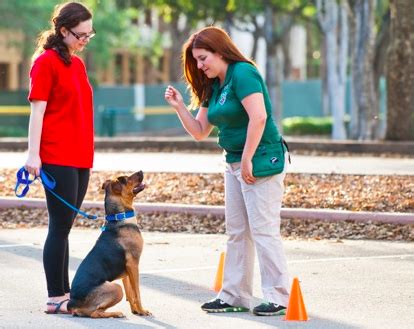Become a certified dog trainer with our comprehensive guide. Understand the process, choose the right program, get hands-on experience, an
Understanding the Certification Process
Becoming a certified dog trainer is a great way to turn your passion for working with animals into a rewarding career. However, the certification process can be a bit overwhelming if you’re not sure where to start. Understanding the certification process is the first step towards achieving your goal of becoming a professional dog trainer.
First, it’s important to research the different certification programs available and choose the right certification program that aligns with your career goals. Each program may have different requirements, such as a certain number of hours of hands-on training or completing a specific curriculum. Once you’ve selected a program, you’ll need to complete the required training to gain the knowledge and skills necessary for the certification exam.
After completing the training, gaining hands-on experience is crucial for building your expertise as a dog trainer. Additionally, you’ll need to pass the certification exam to officially become a certified dog trainer. Once certified, it’s important to maintain certification through continuing education to stay updated on the latest training techniques and best practices in the industry.
Choosing the Right Certification Program
When it comes to pursuing a career as a professional dog trainer, one of the most important steps is choosing the right certification program. With so many options available, it can be overwhelming to determine which program will best suit your needs and provide you with the knowledge and skills necessary to excel in this field.
Before making a decision, it’s essential to do thorough research on the various certification programs available. Look for programs that are accredited by recognized organizations such as the Certification Council for Professional Dog Trainers (CCPDT) or the International Association of Canine Professionals (IACP). These accreditations ensure that the program meets high standards of quality and legitimacy.
Additionally, consider factors such as the program’s curriculum, instructors, and learning format. Look for a program that offers comprehensive training in areas such as canine behavior, training techniques, and business management. It’s also important to choose a program with experienced and knowledgeable instructors who can provide valuable mentorship and guidance.
Completing the Required Training
Completing the required training to become a certified dog trainer is an essential step in starting a successful career in this field. The training process typically involves coursework in dog behavior, training techniques, and animal care. It is important to choose a certification program that offers comprehensive training and hands-on experience with dogs of different breeds and temperaments.
During the training, students learn how to assess and address behavioral issues, design training plans, and work with clients and their pets. The hands-on experience gained during the training is invaluable for developing the skills and confidence needed to work as a professional dog trainer.
It is important to research the training requirements for the certification program you are interested in and make sure you are prepared to commit to the time and effort needed to complete the training. The completion of the required training is a crucial step towards achieving your goal of becoming a certified dog trainer and building a rewarding career working with dogs and their owners.
Gaining Hands-On Experience
Dog Trainer Certification: Gaining Hands-On Experience
One of the most important aspects of becoming a professional dog trainer is gaining hands-on experience. While completing the required training and passing the certification exam are essential steps, nothing can quite replace the experience gained from working directly with dogs in a training setting. This hands-on experience allows trainers to learn how to handle different breeds, temperaments, and behavior issues, and provides invaluable practical knowledge that can’t be gained from textbooks or online courses.
Whether it’s volunteering at a local animal shelter, interning with an experienced trainer, or working as an apprentice at a training facility, gaining hands-on experience is crucial for building the skills and confidence necessary to excel in the field of dog training. It allows trainers to apply their theoretical knowledge in real-world scenarios, and learn how to adapt their training methods to meet the individual needs of each dog they work with.
Furthermore, hands-on experience also provides trainers with the opportunity to develop their own unique training style and techniques, as well as to learn from the experience and expertise of seasoned professionals in the industry. This practical experience not only helps trainers to better understand canine behavior and communication, but also to become more empathetic and effective in their approach to training, ultimately leading to better results for the dogs they work with.
Passing the Certification Exam
Passing the certification exam is the final step in becoming a professional dog trainer. It is essential for demonstrating your knowledge and skills in canine behavior and training techniques. The exam will test your understanding of dog psychology, obedience training, and handling various behavioral issues.
Before taking the exam, it’s crucial to review all the materials covered in the certification program and to thoroughly understand the testing format and requirements. This will help you develop effective study habits and focus on areas where you may need additional preparation.
Furthermore, it’s important to stay calm and confident during the exam. Time management is also key, as you’ll need to pace yourself to ensure you can answer all the questions within the allotted time. With dedication and thorough preparation, passing the certification exam will demonstrate your expertise and commitment to becoming a certified dog trainer.
Maintaining Certification through Continuing Education
After you have completed the required training, gained hands-on experience, and passed the certification exam to become a certified dog trainer, your journey as a professional doesn’t stop there. It is crucial to understand the importance of continuing education in maintaining your certification and staying relevant in the field. Continual learning allows you to stay updated on the latest training techniques, behavior modification methods, and industry standards, ensuring that you are providing the best possible care for the dogs you work with.
Continuing education for dog trainers can come in various forms, including seminars, workshops, webinars, conferences, and online courses. These opportunities not only expand your knowledge and skills but also provide networking opportunities with other professionals in the industry. By staying connected with the broader community of dog trainers, you can exchange ideas, learn from others’ experiences, and collaborate on solving challenging training cases.
Furthermore, staying current with your certification through continuing education demonstrates your commitment to excellence and professionalism in the eyes of your clients. It reassures them that you are dedicated to ongoing improvement and are equipped to address their dog’s behavioral needs effectively. Remember that maintaining your certification is not just about fulfilling a requirement; it’s a way to uphold the highest standards of care and competence in your practice.
Benefits of Being a Certified Dog Trainer
Obtaining a dog trainer certification can lead to a fulfilling and rewarding career. With a certification, dog trainers have the knowledge and skills needed to effectively train and help dogs, as well as their owners. This certification distinguishes professionals from amateurs and provides credibility in the industry.
One of the major benefits of being a certified dog trainer is the potential for higher earning potential. Certified trainers are often able to demand higher rates for their services, as clients are willing to pay for the expertise and professionalism that comes with certification. Additionally, having a certification can lead to more opportunities for employment with reputable companies or organizations that value skilled and qualified trainers.
Furthermore, being a certified dog trainer provides a sense of accomplishment and confidence in one’s abilities. The process of obtaining a certification requires dedication, hard work, and a commitment to ongoing learning and development. This achievement can boost a trainer’s confidence and self-esteem, knowing that they have met the standards and criteria set forth by a respected certification program.
Frequently Asked Questions
What are the requirements for becoming a certified dog trainer?
The requirements for becoming a certified dog trainer vary depending on the certifying organization. However, common requirements may include completing a certain number of hours of hands-on training, passing a written exam, and obtaining a certain level of education or experience in dog training.
How long does it take to become a certified dog trainer?
The time it takes to become a certified dog trainer varies depending on the individual’s dedication and the program they choose. Some certification programs can be completed in a few months, while others may take a year or more to complete.
What are the benefits of getting certified as a dog trainer?
Becoming a certified dog trainer can increase your credibility and marketability in the dog training industry. It can also provide you with access to resources, networking opportunities, and ongoing education that can help you further develop your skills and knowledge.
Is certification necessary to become a successful dog trainer?
Certification is not always necessary to become a successful dog trainer. However, it can enhance your credentials, improve your knowledge and skills, and provide you with a competitive edge in the industry.
Are online dog trainer certification programs legitimate?
There are legitimate online dog trainer certification programs available, but it is important to thoroughly research and choose a program that is accredited and recognized within the industry. Look for programs that offer comprehensive curriculum, hands-on experience, and support from qualified instructors.
What is the average salary of a certified dog trainer?
The average salary of a certified dog trainer can vary depending on factors such as location, experience, and level of certification. According to the U.S. Bureau of Labor Statistics, the median pay for animal trainers, including dog trainers, was $30,430 per year in 2020.
Can I start my own dog training business after getting certified?
Yes, becoming a certified dog trainer can provide you with the knowledge, skills, and credentials needed to start your own dog training business. However, it’s important to also have a solid understanding of business management, marketing, and customer service to successfully run a dog training business.





